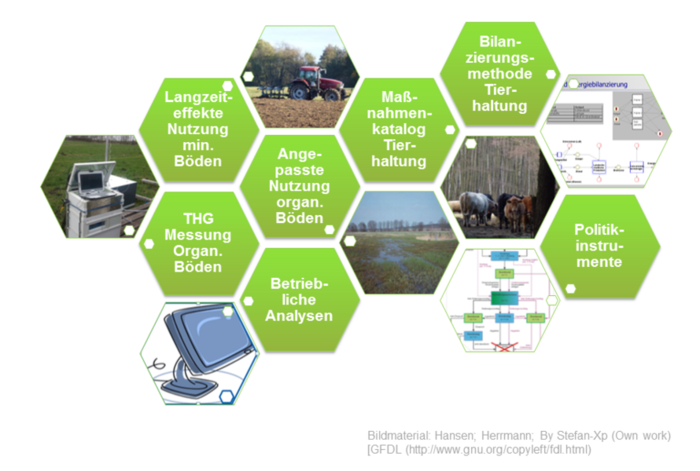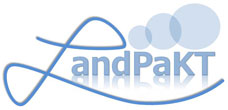LandPaKT - Research topics
LandPaKT systematically analyzed the mitigation potentials and costs and merged them on the farm level:

Soil Use
High mitigation potentials are expected from the re-wetting of previously drained organic sites. Additionally, positive effects can be realised through the substitution of fossil energy carriers by biomass from these re-wetted sites. These potentials and their accompanying costs are to be quantified by measurements of the site-specific emissions after re-wetting. Furthermore, optimized process chains for the biomass utilization are to be identified.
Mineral soils offer further potentials for greenhouse gas mitigation if they are managed to sequester as much carbon as possible as well as to emit as little as possible of the potent greenhouse gas nitrous oxide. This could be achieved by an optimized nitrogen fertilizer management, reduced soil cultivation, improved humus and water management. As approved knowledge of long-term effects is still missing, long-term field measurements were used to model the effects of different management options on soil organic carbon contents and to derive mitigation costs.
Animal Husbandry
Animal husbandry including feed production and land use change accounts for approximately. 18% of the global greenhouse gas emissions 1. The increase of the global human population with the resulting increase in food demand accompanied by changed consumption patterns urgently call for the exploitation of the mitigation options. Systematic analyses on the farm level were performed as well as a reliable accounting method was aimed at to result in optimal combinations of measures in animal husbandry.
1 Steinfeld, H. et al. (2006): Livestock’s long shadow. Environmental issues and options. AO, Rome.
Analyses on the Operational level
The results on the operational level will be modelled for exemplary farms. Combinations of different measures and their trade-offs will be analysed, so that those activities which combine high mitigation potentials with lowest possible costs can be identified.
Agricultural Policy
The farm-level approaches will be further developed to possible policy instruments. Their applicability will be analysed, e.g. policy-defined levels of mitigation, incentive schemes, or self-organised approaches within the agricultural sector. The effects of policy instruments are first to be analysed on the farm level and then to be up-scaled to the national level.

